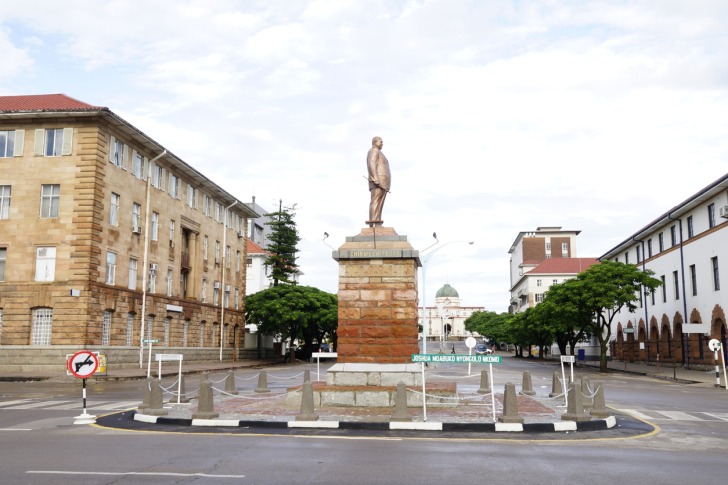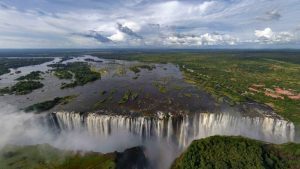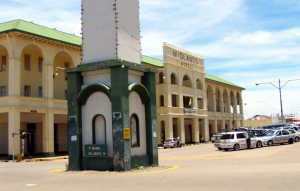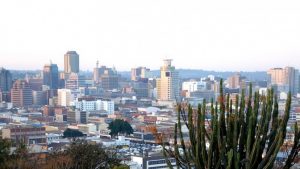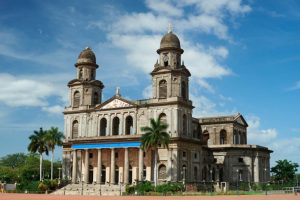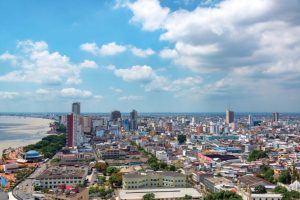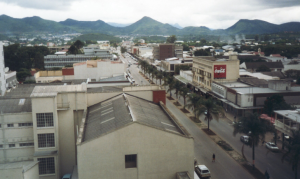Bulawayo, Zimbabwe is the second-largest city in Zimbabwe.
It is also the largest city in the Matabeleland region.
The city, founded around 1840, underwent several name changes as different countries and factions seized the town over a period of several decades.
Bulawayo became a city in 1943.
It is known for being an industrial center.
The city has a reputation for producing motor vehicles, car parts, electronics, textiles, and other products.
Corruption, declining infrastructure, and health concerns in Bulawayo are some reasons that workers started moving to South Africa or to other areas.
The culture, the beautiful parks, the museums, and other sites are some reasons that people travel to Bulawayo.
One reason that some people may wonder if they should visit Bulawayo is because of safety concerns.
Knowing whether there are safety risks is likely to help travelers decide how to enjoy the area without experiencing dangers or other concerns.
Warnings & Dangers in Bulawayo

OVERALL RISK: MEDIUM
Travelers often visit Bulawayo and have a wonderful time without experiencing any safety issues. Travelers must stay aware of the current travel advisory from the U.S. Department of State, and the risk of civil unrest at the time of their visit. People who travel to Bulawayo, Zimbabwe should take general safety precautions.

TRANSPORT & TAXIS RISK: LOW
The Bulawayo City Council has undertaken efforts to ensure that public transportation is safe for residents and visitors. They also implemented efforts to make sure that public transport meets the needs of the people. Travelers still need to watch their belongings while taking buses, or shared transport vehicles. Take a taxi that is from a regulated taxi company. The local police recently launched a large-scale plan to drive pirate taxis out of the city. Avoid unlicensed minibusses. They are often not regulated and pose safety risks.

PICKPOCKETS RISK: HIGH
People who visit Bulawayo, Zimbabwe should not carry their wallet, credit cards, or cash in a back pocket. Do not carry a purse that does not have a zipper. Wearing clothing that has inside pockets is one way to keep your cash, credit cards, and wallet safe from pickpockets.

NATURAL DISASTERS RISK: HIGH
Bulawayo is prone to a variety of natural disasters. Droughts have caused a water crisis, with some residents not having access to water for several days at a time. The city sometimes rations water. Issues with water scarcity have plagued Bulawayo for several years. Flooding may cause devastation, damage, and safety risks for the people of Bulawayo and for travelers.

MUGGING RISK: MEDIUM
Some crime has recently increased in Bulawayo. Travelers should take precautions to minimize their risk of being attacked by a mugger. Do not walk the streets at night. Stay away from isolated areas. Keep a low profile by not wearing flashy clothes or jewelry. Stay with your tour group or friends.

TERRORISM RISK: HIGH
Terrorism is an ongoing risk in Bulawayo. Terrorists failed in their June 2018 assassination attempt against the president. There have been incidents of widespread protests and rioting. Civilians have been beaten in the streets. The local government launched a crackdown on terrorists, which some people said amounted to people being forcibly dragged from their homes and beaten by security forces.

SCAMS RISK: HIGH
Local police in Bulawayo warn people about a variety of scams. Travelers should avoid letting anyone offer to help them exchange money. Do not let anyone that you do not know take you anywhere if the person is not the driver of a reputable taxi company or other public transportation company. Do not purchase products that the seller claims are designer goods. Counterfeit goods are illegal, even if travelers do not know that they purchased counterfeit goods.

WOMEN TRAVELERS RISK: MEDIUM
Bulawayo is generally safe for women travelers when they are out during the daytime hours. Women should not go out by themselves at night, even if there is a group of women going out together. Female travelers should dress modestly to avoid any unwanted attention. Do not walk in remote neighborhoods, even during the day.

TAP WATER RISK: HIGH
Do not drink the Bulawayo tap water. A 2022 report indicated that the Bulawayo borehole water was contaminated with bacteria and raw sewage. Water safety is an ongoing issue in Bulawayo. Drink bottled water to avoid the risk of waterborne diseases.
Safest Places to Visit in Bulawayo
See spectacular animals while on a safari.
Enjoy learning about the culture and history of Bulawayo.
Travelers have several options for safe places to visit while they are in Bulawayo.
Take a city tour to experience the culture and vibe of the city.
Stop at the National Art Gallery before exploring the shops.
Visit the shops to find crafts and unique items and to enjoy local food.
Take a day trip to the Khami Ruins.
It is the second-largest stone monument in Zimbabwe.
The Khami Ruins was built during the 16th century and is one of the few sites that was not destroyed by treasure hunters.
Explore the rock landforms and the awe-inspiring rock paintings at Matobo Hills.
The granite rock formations are millions of years old.
The rock paintings are at least 13,000 years old.
The UNESCO World Heritage Convention explains that the paintings provide evidence that the Matobo Hills have been occupied for 500,000 years.
Visit a village elder at Silunguzi Village after taking a tour of the magnificent Matobo National Park.
See giraffes, zebras, impalas, and other animals.
Learn about the wide variety of flora and fauna.
Visit the Bulawayo Railway Museum.
Learn about the history of the Bulawayo railway network.
See the Jack Tar, from 1889, which was the first train to cross Victoria Falls.
Visitors can also climb aboard a 19th-century steam engine and explore other trains.
Some other safe places to visit include the Natural History Museum, the Chipangali Wildlife Orphanage and Wildlife Rescue Centre, and Nesbitt Castle.
Places to Avoid in Bulawayo
Travelers who visit Bulawayo need to avoid any place that is on a remote street or area.
Avoid secluded trails or park areas.
Stay away from large groups who may be starting a protest or who are there to commit criminal acts.
Terrorists may attack people, including U.S. citizens, at shopping malls, high profile public events, and at hotels and restaurants that are known to be popular with travelers.
Drive to a well-lit public location or to a police station if someone tries to lure you out of your car or if you think that someone is following you.
Safety Tips for Traveling to Bulawayo
- Do not go to bars or nightclubs alone. There is a higher safety risk for travelers when criminals see that they are alone. Do not walk to restaurants, bars, or clubs at night.
- Do not carry your actual passport with you. Carry a copy of your passport, not the actual document. Keep your passport in your room safe or in the hotel safe.
- Hold on to your phone. Do not place your phone on a restaurant table or the counter when shopping anywhere in Bulawayo. It takes a second to grab your phone.
- Keep your purse in your lap at public locations. Do not hang your purse on the back of your chair at a restaurant or other public location. It will not be there when you reach for it. Do not place your purse on the restaurant table. Keep it in your lap.
- Avoid carrying valuables. Do not carry your valuables with you when you travel to Bulawayo. Do not have valuables in sight if you rent a car.
- Spend as little time as possible at lights and intersections. Smash-and-grab crimes are one way that criminals target tourists. They smash car windows and grab whatever they see when travelers are at traffic lights or stopped at intersections.
- Consider the risks of taking pictures. Do not take pictures of anything in Bulawayo, except for at obvious tourist locations. People have been detained for taking pictures of sensitive locations.
- Respect the animals. Do not violate any rules or regulations when visiting game parks or wildlife areas. Keep a safe distance from wild animals. Stay in the vehicle.
- Protect your health. Be careful to avoid injuries. Bulawayo is one of the few cities that has an ambulance service, but the response time is slow. Ambulances do not have the latest medical equipment.
- Consider not renting a car. Travelers are not used to the hazards of driving in Bulawayo. Speeding is common. There are DUI laws, but they are not always enforced by the police. Intoxicated drivers are a safety risk.
So... How Safe Is Bulawayo Really?
Bulawayo is generally safe during the daytime when travelers pay attention to their surroundings and follow other safety precautions.
Travelers who visit Bulawayo with a tour group should not stray from that group.
Crime has recently increased in Bulawayo.
The U.S. Department of State issued a Level 2 travel advisory to Zimbabwe because of crime and “official harassment of U.S. Citizens.”
Staying aware of the risk of demonstrations, natural disasters, and terrorism helps to protect the safety of travelers who visit Bulawayo.
How Does Bulawayo Compare?
| City | Safety Index |
|---|---|
| Bulawayo | 57 |
| Harare | 66 |
| Victoria Falls | 60 |
| Gweru | 59 |
| Mutare | 59 |
| Buenos Aires (Argentina) | 60 |
| Vancouver (Canada) | 82 |
| Cordoba (Argentina) | 61 |
| Toronto (Canada) | 81 |
| Melbourne (Australia) | 80 |
| Montreal (Canada) | 81 |
Useful Information

Visas
The U.S. Department of State indicates that travelers need a tourist visa to visit Zimbabwe. Tourists obtain a visa at airports or at other border ports of entry. Travelers cannot get a tourist visa at the Zimbabwean Embassy in Washington.

Currency
The currency for Zimbabwe is the Zimbabwean dollar. Exchange currency only at banks or authorized locations. Many businesses in Bulawayo have a license to trade in U.S. dollars. Carry small bills when using U.S. dollars.

Weather
Bulawayo is semi-arid and hot. It has milder weather than some places in Africa because of its higher altitude. Travelers likely want to avoid visiting Bulawayo during the rainy season. Pack clothing and accessories for warm days and cooler nights.

Airports
The Bulawayo Airport is the Joshua Mqabuko Nkomo International Airport. Travelers take a taxi, bus, or shuttle to their hotel or other destination. Some travelers rent a car.

Travel Insurance
Purchasing travel insurance is imperative for travelers who visit Bulawayo. Travel insurance helps to protect against losses from crime or other safety risks.
Bulawayo Weather Averages (Temperatures)
Average High/Low Temperature
| Temperature / Month | Jan | Feb | Mar | Apr | May | Jun | Jul | Aug | Sep | Oct | Nov | Dec |
|---|---|---|---|---|---|---|---|---|---|---|---|---|
| High °C | 29 | 28 | 28 | 27 | 25 | 23 | 22 | 26 | 29 | 30 | 30 | 28 |
| Low °C | 17 | 17 | 16 | 14 | 11 | 8 | 8 | 10 | 14 | 16 | 17 | 17 |
| High °F | 84 | 82 | 82 | 81 | 77 | 73 | 72 | 79 | 84 | 86 | 86 | 82 |
| Low °F | 63 | 63 | 61 | 57 | 52 | 46 | 46 | 50 | 57 | 61 | 63 | 63 |
Zimbabwe - Safety by City
| City | Safety Index |
|---|---|
| Bulawayo | 57 |
| Gweru | 59 |
| Harare | 66 |
| Mutare | 59 |
| Victoria Falls | 60 |
